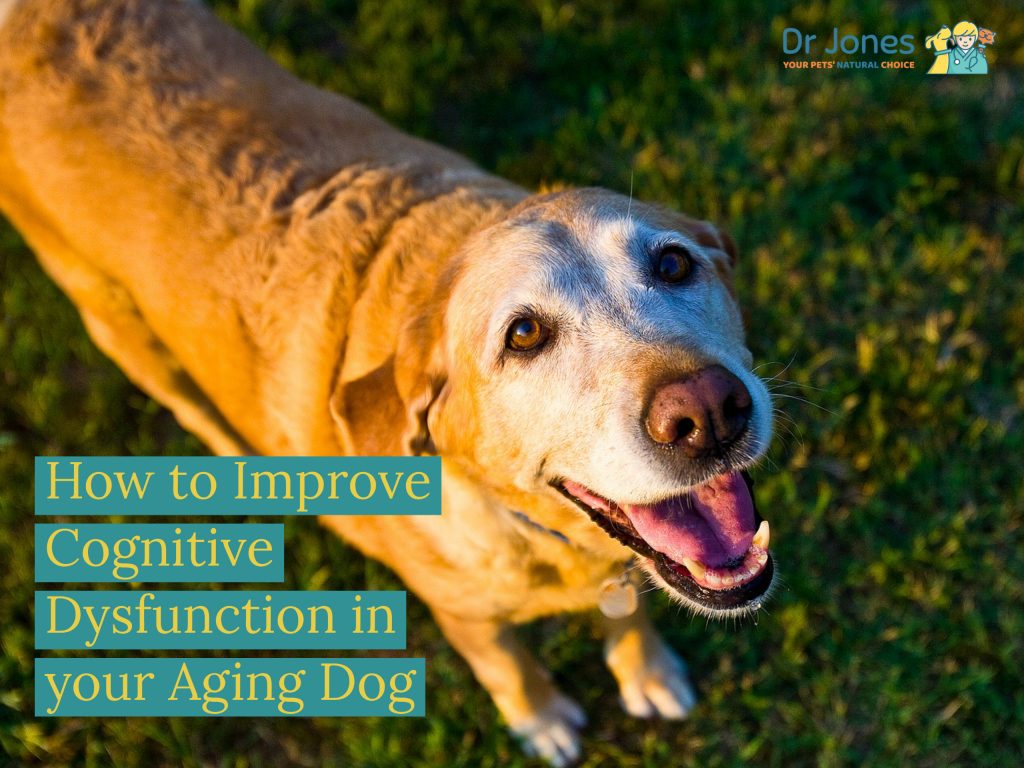How to Improve Cognitive Dysfunction in your Aging Dog

Once your dog hits the age of 7, they are considered a senior dog. (For cats on the other hand, the age is 10). Dogs accumulate deposits of beta-amyloid (a protein plaque) in the brain with age. Dogs show signs similar to people with Alzheimer’s. It’s important to give your pet as much comfort as you can as they age.
According to an article (linked below) written regarding cognitive function in major depressive disorder, cognitive dysfunction “refers to deficits in attention, verbal and nonverbal learning, short-term and working memory, visual and auditory processing, problem solving, processing speed, and motor functioning.”
Cognitive dysfunction manifests in many ways:
- Decrease in appetite
- Cataracts
- Confusion
- Lack of interest
- Deafness
- Excessive barking, and more
So, how can we make them more comfortable?
Supplements
OMEGA – 3 FATTY ACIDS:
Omega – 3 fatty acids are vital in improving cognitive dysfunction They help to slow the progression of human dementia and Alzheimer’s disease. A study was performed on 142 older dogs with a variety of behavioral abnormalities such as:
- Disorientation
- Disrupted sleep patterns
- Altered interactions with family members
- Altered activity levels
- Loss of house training
During the 60-day period, dogs fed a DHA-supplemented food showed significant improvement in every one of these behavior categories.
Omega -3’s can help reduce inflammation in the body, ultimately reducing pain common in joint pain or arthritis. Krill Oil is shown to be especially effective, as the body can more easily absorb nutrients. It can also improve the immune system and boost hearth health.
For dosage, I recommend 1000 mg/10 lbs daily.
I’ve added a link at the bottom of the page for my Krill Oil supplement.
MELATONIN:
Frequently used for older pets that have trouble getting to sleep and pace at night. Melatonin also makes the mitochondria more effective.
For dogs, give 50 ug/lb of body weight 1 hour before bedtime and on an empty stomach. Try it for 2 weeks to assess if it is working.
MEMORY HELPERS:
Ginseng and Ginkgo Biloba. Ginkgo Biloba has been found to be effective in improving cognitive function in people with certain mental diseases. It increases profusion of blood and oxygen delivery to parts of the brain (cerebrum).
Give 1 drop of the tincture per 1 lb of body weight twice daily.
ANTIOXIDANTS:
- Taurine – 500 mg, 3x daily
- Flavonoids – 250 mg/10 lbs. daily
- Coenzyme Q. – 1 capsule daily/10 lbs.
- Vitamin E – 100 IU/10 lbs. daily
Vitamin E appears to be most important in maintaining healthy brain function and delaying further loss of brain tissue. An antioxidant combination (Vitamin E, Vitamin C, and Selenium) may be most effective.
For dosage, give 100 IU of Vitamin E/10 lbs.
CURCUMIN:
New research in people has shown a strong link between chronic inflammation, and degenerative brain disorders, such as cognitive dysfunction. The active ingredient in the spice turmeric is curcumin, and this is shown to be effective in people with Alzheimer’s.
The animal 95% curcuminoid dose is 100mg per 10lbs daily.
Additional Solutions
EXERCISE:
The importance of this cannot be overemphasized, and it is one of the easiest and least expensive remedies. Get more oxygen to your pet’s brain by having them exercise regularly.
BEHAVIOR/ENVIRONMENT MODIFICATION:
“Behavior can be effectively managed by providing daytime activities and opportunity for play, and structured social interaction for physical and mental stimulation,”
“Exposure to sunlight will help regulate the sleep-wake cycle. If they can’t walk anymore, use a wagon or a stroller. Anything to get them sunlight and stimulation”.
REGULAR TOUCH:
Touch and positive interaction with your pet – it has been found that in people even though they may not remember an interaction, the human touch can stimulate parts of the brain that cause emotion. This then has an effect of improving symptoms of Alzheimer’s. The same principles can be applied to pets.
WARM AND COMFORTABLE:
Keep your house warmer and provide extra soft, cushy bedding. Dogs can feel cold more easily as they get older.
I am reading in so many places to give my dog x-number of drops of Ginkgo Biloba but I have two extracts I’ve found: one is 250mg per 1ml and the other is 1,000mg per 1ml so it’s confusing. My 18 year old toy poodle is 8 lbs… can you recommend a dosage for each of these?
Thank you!